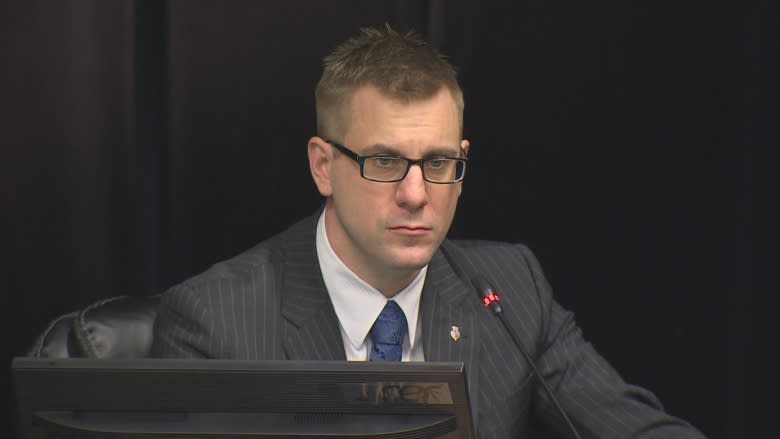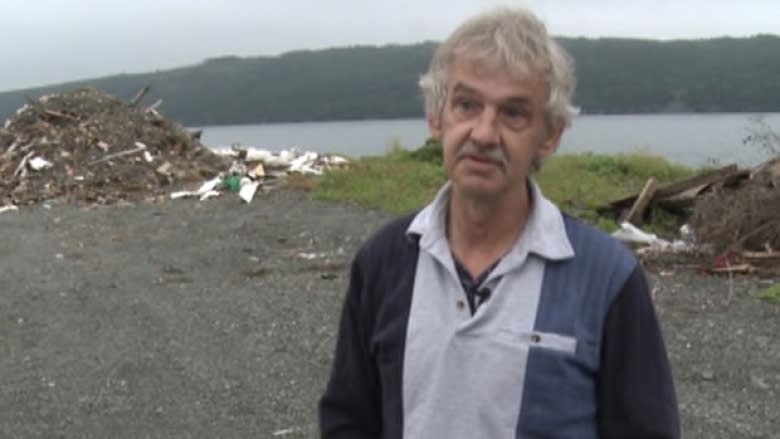Dunphy inquiry: Joe Smyth to be questioned about controversial email
A controversial email written by Const. Joe Smyth after the fatal shooting of Don Dunphy, and leaked to the media on the day of Dunphy's funeral, will be highlighted as a public inquiry into the shooting resumes Monday.
Smyth, 38, a Royal Newfoundland Constabulary officer, sent the email to his colleagues on the police force but it was leaked to CBC News.
In the email, Smyth expressed no regret for fatally shooting Don Dunphy, 59, but said he wished some other kind of earlier intervention had been possible.
"Although I cannot regret my actions last Sunday, I unequivocally wish I could have visited Mr. Dunphy at a point in his life where another level of intervention may have been possible," the officer wrote in the email.
Smyth, who was a member of the premier's security unit at the time, travelled to Dunphy's Mitchells Brook home on April 5, 2015, to investigate tweets by Dunphy that criticized then–premier Paul Davis and other provincial politicians.
In testimony at the inquiry, which began hearings Jan. 9, Smyth said he shot at Dunphy four times after Dunphy pointed a rifle at him.
'Cyber-trial in a veritable town square'
The officer, who said it was necessary to let his colleagues know about his "sentiments on Sunday's tragedy," sent the email to all RNC staff at 7:30 a.m. on the following Friday, and appeared to take aim at those who have speculated about the incident.
"The vocal minority engaged in social media and open line talk shows appear to want an immediate cyber-trial in a veritable town square, instead of a professional and detailed investigation involving interviews and scientific forensic analysis," the officer wrote.
In the almost 900-word email, he discussed the responsibility of police officers to protect elected politicians through intelligence-led investigations, which Smyth described as proactive, not reactive.
He urged his co-workers to reach out to the Don Dunphys of society and help them.
"For Mr. Dunphy, we were simply too late — but that doesn't mean we stop forging ahead into hopelessness, anguish and despair with the view of creating betterment, safety and well-being for the citizens we serve."
The RCMP investigated the shooting and concluded no charges were warranted against Smyth.
Meghan Dunphy's reaction
Don Dunphy's daughter, Meghan, 28, spoke about Smyth's email when she testified at the inquiry Jan 9.
She said it was unacceptable that Smyth said he did not regret killing another person. She also said the release of the letter on the day of her father's funeral made a painful day even more difficult.
Dunphy also questioned Smyth's suggestion that her father needed an "earlier intervention."
Lawyer gave notice the email will be discussed
When the inquiry adjourned Wednesday, commission counsel Sandra Chaytor said she expects to finish her questioning of Smyth on Monday morning. She said she will have questions about his email.
Chaytor has been questioning Smyth since he first took the stand Jan. 16. When she is done, other lawyers at the inquiry will have an opportunity to cross-examine Smyth.
Full text of Smyth's email
The following is the full text of Smyth's email:
Friends and Colleagues —
It is with a heavy heart I write this message, however, I feel it necessary that you hear my sentiments on Sunday's tragedy — the death of Mr. Donald Dunphy. Firstly, please accept my sincere gratitude for the messages, handshakes, and general support you have shown my family and I. We live in a period where opinion is ubiquitous, while facts seemingly take a back seat to what is titillating. The vocal minority engaged in social media and open line talk shows appear to want an immediate cyber-trial in a veritable town square, instead of a professional and detailed investigation involving interviews and scientific forensic analysis. I have come to the conclusion however that this is where we have a responsibility, and where we must take the time to reflect on why we decided to enter the world of Policing.
It is very easy for us to become frustrated at what appears to be prolific ignorance prevailing in our society (something I have had to reconcile myself); but we didn't choose to become police officers because it was easy. We are police officers, and we are the civilian police staff, because we get the unparalleled opportunity to help people. For Mr. Dunphy, we were simply too late — but that doesn't mean we stop forging ahead into hopelessness, anguish and despair with the view of creating betterment, safety and wellbeing for the citizens we serve.
Our community is reeling from this terrible misfortune, and we must do what we are supposed to do in any community tragedy — we must show strength, understanding, compassion, leadership, and empathy. This is our responsibility; so there lies in this most unfortunate of circumstances an opportunity to educate and empathize.
We are the experts in our field, and can't expect everybody to simply "get it." While we cannot discuss confidential details of any police file or investigation, we can indeed articulate our expertise in a concise way that alleviates some of the confusion that exists even amongst our own friends and family:
Protective Policing — is predicated on intelligence led investigations. Most will inherently view police work as something that is reactive. ie. Somebody is threatened and we respond accordingly. Intelligence based policing is proactive, and in the case of protective services, attempts to identify potential concerns and disconcerting behavior, and through a risk analysis endeavors to assign threat levels and implement corrective measures before an act of targeted violence occurs. Use the Ottawa shooting as an inverse comparison; society was quick in this case to ask where the police were in identifying red flags. Erroneous misleading statistics associated to the depth of work police carry out is difficult to explain in a media sound-bite, but people need to understand that a singular police file number does not capture what we do in its totality.
Security for elected officials — is sadly a topic of public debate. Newfoundland and Labrador is an amazing place to live and work. We are however not impervious to singular acts of violence. Our elected officials make great sacrifices to carry out important work, and they suffer a level of public exposure and scrutiny like no other group I am aware of. They are charged with managing public funds and our social programs. This leads to individuals and groups who will be disgruntled, and when desperation and instability is added to the mix you will have security concerns. Our elected officials and their families deserve to live and do their work unencumbered by concerns for their safety and well being. Whether our Premier wears a blue, red or an orange stripe, their security should be as static as the desk in their office. Some will tell you that our Premier should be, or is an ordinary person; the reality however is that while they may have once been an "ordinary person" (if such a thing exists), they are now our Premier, and there is nothing ordinary about that Office. Society has eroded many of the comforts and standard amenities that should come with being an elected official — all in the name of politics. We are however the Provincial Police, and we will continue to provide a service and make recommendations that are founded in principle and good policing philosophy.
A capable and professional police service requires community support and confidence for success; to achieve community support and confidence we require dedicated professionals who are well trained, proud and confident in their duties, and who can empower stakeholders to play an active role in creating safer communities. When such tragedies are at our forefront, we risk eroding that confidence.
While there are many people who are and will be impacted by this, make no mistake that at the core of this matter, there is a family that no longer has a father and a brother. I sincerely appreciate the tremendous support you have shown me and my family, but we must also bear in mind that we have a community who is confused, scared, hurt and grieving. We must also help them heal.
Although I cannot regret my actions last Sunday, I unequivocally wish I could have visited Mr. Dunphy at a point in his life where another level of intervention may have been possible. Our lives can change or end in the blink of an eye. Please seize any opportunity to help those who need it.



